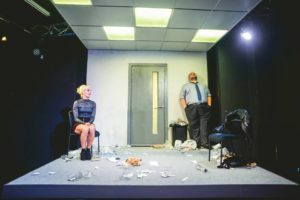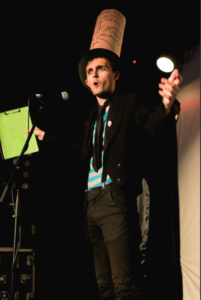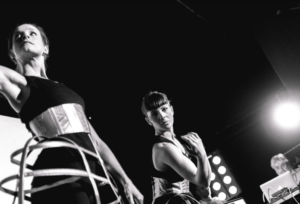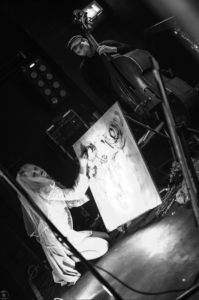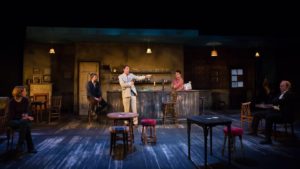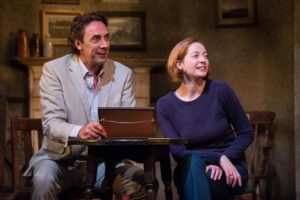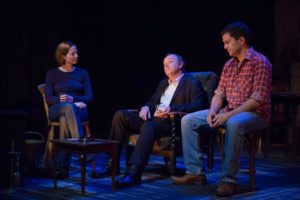 (4 / 5)
(4 / 5)
This was my second time to attend a ‘Play, Pie and a Pint’ at the Sherman Theatre, Cardiff and once again it did not disappoint. This low-cost evening is a great option for those looking for bite-size and accessible nights at the theatre. Perhaps in anticipation of the subject material in the play, there was a vegetarian pie option. Thankfully, no pork pies were on the menu!
Snout is the latest new product from Sherman Theatre and Oran Mor’s partnership and is a new script from the writer Kelly Jones: winner of the BBC Wales Drama Award in 2014.
Those with a penchant for pork – beware! Snout is a play that does not beat around the bush when it comes to broaching the subject of animal welfare. The central three characters are pigs – Coco, Lacey and Viv , skilfully represented by Claire Cage, Michele Gallagher and Sally Reid.
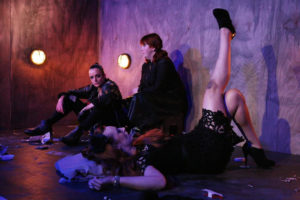
We are led through their backstories from within a cramped, dirty lorry and as the tension and claustrophobia sets in, it slowly becomes clear that Viv is keeping a secret that even she doesn’t want to face. Far from a day out ‘at the fete’ there is a far worse fate awaiting them at the other end of the journey. As the panic and the fear becomes palpable – there is scrapping and squealing via a tense soundtrack courtesy of Andy Cowan, squabbling and bickering between Coco and Lacey and desperate praying and bargaining from Viv. There is something horrible brewing for these three little pigs.
Director Kenny Miller could so easily have played up the ‘pig’ image: via masks, curly tails or cutesy ears. But the three characters clothes and regular appearance only serve to humanise them and make the audience acknowledge what is about to happen to them.
‘How would they feel if it was them – their children?’ one of the characters says. We realise how pigs and pork are so firmly embedded our popular culture, our vernacular and our food choices: greedy pig, pig ugly, pig ignorant, bringing home the bacon, looking ‘porky’.
There are some really grim passages where Viv describes how her sister Annie was taken away, how the meat is butchered, prepared, consumed and sometimes even sexualised and fetishised. As an audience member, I felt almost complicit in the suffering of Viv, Coco and Lacey and the theatre space and sheer proximity to the cramped box feels claustrophobic for you too.
There are tender moments played out following Lacey’s electric shock after a panicked escape attempt. I could not take my eyes off Sally Reid (who plays Coco), whose spiky and awkward demeanour is softened as we progress in the play.
The play shines a light on the sheer hypocrisy and selfishness of meat consumption and meat for fashion purposes and for me certainly, threw up a few questions. Why do I care so much about whether my chicken is free range, but not my pork? Why do I crinkle my nose at the thought of eating veal, but not suckling pig? Why is tripe revolting to me but not belly pork? I know that pigs are intelligent animals, so why have I never thought about whether they know what’s awaiting them at the end of their trips to the slaughterhouse. Do I really care about animals if I have this knowledge and do not act upon it?
I had my reservations about whether or not the play would be preachy or overtly anti-meat eating, but it was to character-led for that. What Kelly Jones’ script does manage to do well is to make you question yourself, to step outside your frame of reference and pre-conceived thoughts. I can’t tell you if Coco, Lacey and Viv made it….but I can tell you that my enthusiasm for ‘meat free’ Mondays has tripled since seeing the play. And I will lay off the bacon for a while, I think…
Type of show: Theatre
Title: Snout (A play, Pie and a Pint)
Venue: The Sherman Theatre, Cardiff
Dates: 8-12 Nov
Author: Kelly Jones
Director: Kenny Miller
Ross Kirkland / Chris Reilly: Lighting Designer
Andy Cowan: Sound Designer
Jonathan Scott: Designer
Gemma Patchett: Assistant Designer
Claire Cage: Coco
Michele Gallagher: Lacey
Sally Reid: Viv

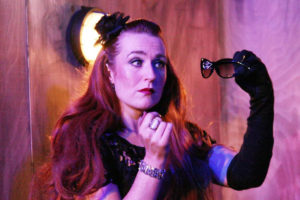
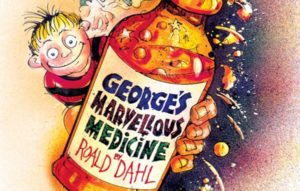
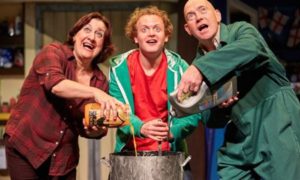



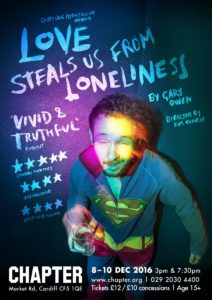

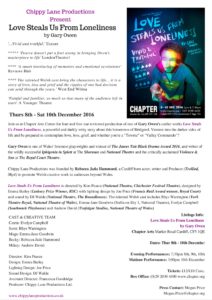

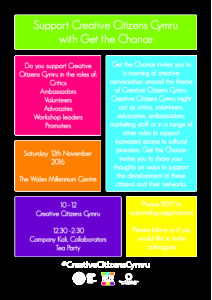

 (5 / 5)
(5 / 5)